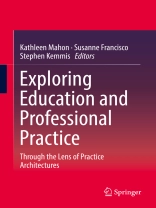This book was written to help people understand and transform education and professional practice. It presents and extends the theory of practice architectures, and offers a contemporary account of what practices are composed of and how practices shape and are shaped by the arrangements with which they are enmeshed in sites of practice. Through its empirically-based case chapters, the book demonstrates how the theory of practice architectures can be used as a theoretical, analytical, and transformational resource to generate insights that have important implications for practice, theory, policy, and research in education and professional practice. These insights relate to how practices are shaped by arrangements (and other practices) present in specific sites of practice, including early childhood education settings, schools, adult education, and workplaces. They also relate to how practices create distinctive intersubjective spaces, so that people encounter one another in particular ways (a) in particular semantic spaces, (b) that are realised in particular locations and durations in physical space-time, and (c) in particular social spaces. By applying such insights, readers can work towards changing practices by transforming the practice architectures that make them possible.
Зміст
1 Introduction: Practice theory and the theory of practice architectures.- 2 Learning Spaces and Practices for Participation in Primary School Lessons: A focus on classroom interaction.- 3 Learning Educational Theory in Teacher Education.- 4 Practice Architectures of Simulation Pedagogy: From fidelity to transformation.- 5 Infants’ Practices: Shaping (and shaped by) the arrangements of early childhood education.- 6 Mentoring as Part of a Trellis of Practices that Support Learning.- 7 Using the Theory of Practice Architectures to Explore VET in Schools Teachers’ Pedagogy.- 8 Collegial Mentoring for Professional Development.- 9 School Development in Tough Times.- 10 Leading as a Socially Just Practice: Examining educational leading through a practice lens.- 11 Provoking Praxis amidst a Faculty Restructure: A practice architecture perspective.- 12 Articulating the Practice Architectures of Collaborative Research Practice.- 13 Coming to ‘Practice Architectures’: A genealogy of the theory.-14 Roads Not Travelled, Roads Ahead: How the theory of practice architectures is travelling.- 15 Transforming education and professional practice.
Про автора
Kathleen Mahon is an Adjunct Research Fellow at the Research Institute for Professional Practice, Learning and Education, Charles Sturt University, Australia. She has taught in universities, secondary schools and outdoor education centres in Australia. Kathleen is a member of the Pedagogy Education and Praxis (PEP) international research network and is actively involved in cross-national projects related to teacher education and higher education. Her research interests include educational and research praxis, higher education pedagogy, the professional learning of teachers, and practice theory. Kathleen’s doctoral research examined how critical pedagogical praxis is nurtured in higher education.
Susanne Francisco has worked in universities, schools and Vocational Education and Training organisations, and is currently a teacher educator in Adult and Vocational Education at Charles Sturt University. She has held research and professionaldevelopment positions in the Australian Commonwealth government. Her research interests include work-based learning; mentoring; continuing professional learning; the learning of casual employees; and leading teaching and learning in adult and vocational education. Susanne is a member of the PEP international research network.
Stephen Kemmis is Professor Emeritus in the Research Institute for Professional Practice, Learning and Education, Charles Sturt University, Wagga Wagga, Australia. He is co-author with Wilfred Carr of Becoming Critical: Knowledge, Education and Action Research (Falmer, 1986) and, with Robin Mc Taggart and Rhonda Nixon, of The Action Research Planner: Doing Critical Participatory Action Research (Springer, 2014). His recent writings on the theories of practice architectures and ecologies of practices include (with Wilkinson, Edwards-Groves, Grootenboer & Bristol) Changing Practices, Changing Education (Springer, 2014). Stephen is a member and co-founder of the PEP international research network.












